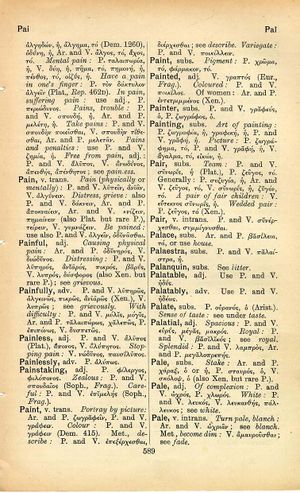palaestra
English > Greek (Woodhouse)
subs.
P. and V. παλαίστρα, ἡ.
Latin > English (Lewis & Short)
pălaestra: ae, f., = παλαίστρα,
I a wrestling-school, wrestling-place, place of exercise, palœstra, where youths, with their bodies naked and anointed with oil, practised gymnastic exercises. Such palæstrae were also attached to private houses: in palaestram venire, Plaut. Bacch. 3, 3, 20; cf. id. ib. 3, 3, 27: in palaestrā atque in foro, id. Am. 4, 1, 3: statuas in palaestrā ponere, Cic. Verr. 2, 2, 14, § 36: pars in gramineis exercent membra palaestris, Verg. A. 6, 642. —Of the palæstrae in private houses, Varr. R. R. 3, 13: (Fibrenus) tantum complectitur quod satis sit modicae palaestrae loci, Cic. Leg. 2, 3, 6; id. Q. Fr. 3, 1, 2.—
II Transf.
A A wrestling in the palæstra, the exercise of wrestling: non utuntur in ipsā lusione artificio proprio palaestrae, sed indicat ipse motus, didicerintne palaestram an nesciant, Cic. de Or. 1, 16, 73: exercent patrias oleo labente palaestras Nudati socii, Verg. A. 3, 281: corpora agresti nudant palaestrae, id. G. 2, 531: uncta palaestra, Ov. H. 19, 11: nitidā palaestrā ludere, id. ib. 16, 149; cf. Luc. 4, 615.—Mercury was regarded as the founder of wrestling combats, Hor. C. 1, 10, 4; Luc. 9, 661.—
B In the lang. of comedy, a brothel, Plaut. Bacch. 1, 1, 34; Ter. Phorm. 3, 1, 20.—
C Exercises in the school of rhetoric, rhetorical exercises, a school of rhetoric, a school: nitidum genus verborum sed palaestrae magis et olei, quam hujus civilis turbae ac fori, Cic. de Or. 1, 18, 81: non tam armis institutus, quam palaestrā, id. Brut. 9, 37: sic adjuvet, ut palaestra histrionem, id. Or. 4, 14; 56, 186; cf. id. ib. 68, 228: Antipater habuit (in scribendā historiā) vires agrestes ille quidem atque horridas sine nitore ac palaestrā, id. Leg. 1, 2, 6.—*
D An art or skill: utemur eā palaestrā, quam a te didicimus, Cic. Att. 5, 13, 1.

